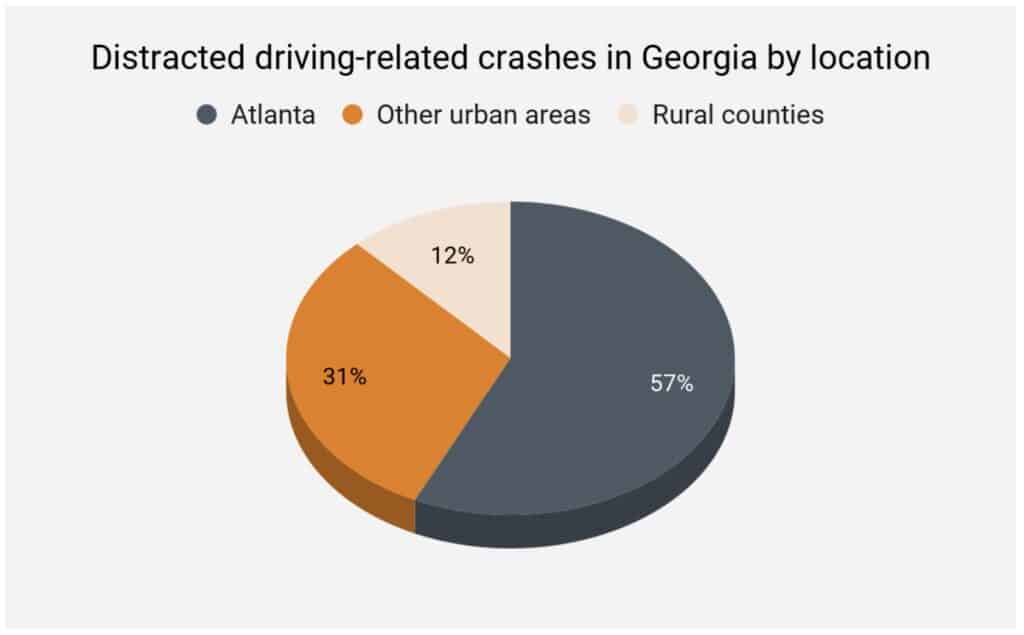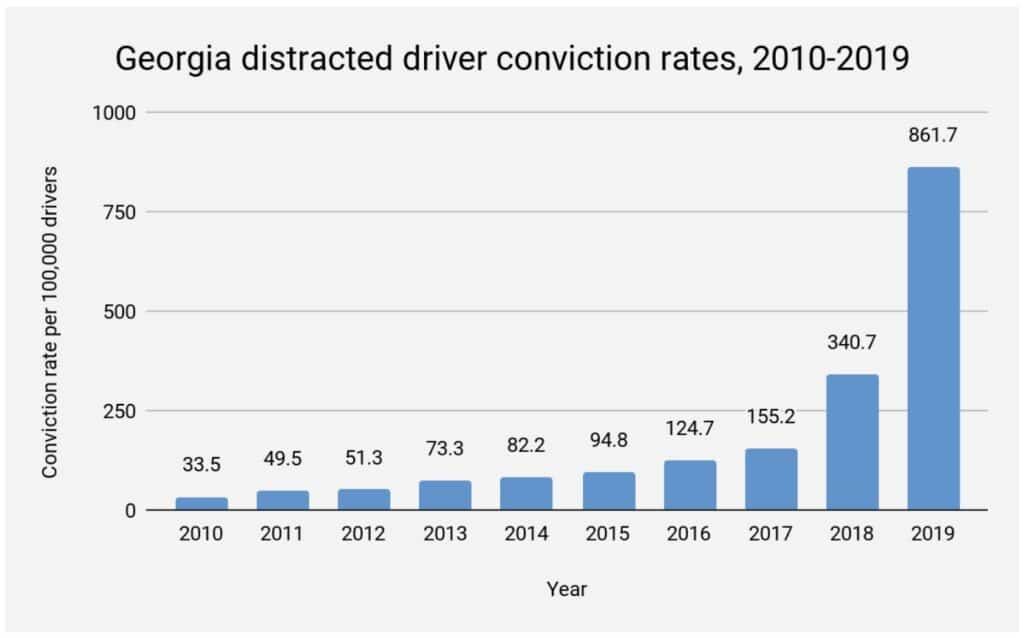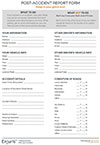
Tips for avoiding a distracted driving accident—and why that’s so important
Georgia has strict laws against any type of distraction while driving. It’s not all about texting and phones.
We all feel driven to distraction sometimes.
Most of us are busy a lot of the time, juggling more balls than we can realistically keep in the air at once. And, while you’re likely accustomed to multitasking at work, at home, and almost anywhere else, there’s one place where you should never multitask... and that’s in the car.
The Georgia Governor’s Office of Highway Safety defines a distraction-related crash as:
“... [A]ny crash in which a driver was reported as a confirmed distracted driver or identified as a suspected distracted driver... when drivers divert their attention from the driving task to focus on some other activity. Often discussions regarding distracted driving center around cell phone use and texting, however distracted driving also includes other distraction-related activities that are manual, visual, or cognitive.”
The agency’s Distracted Driver Data Report says that 56% of all traffic crashes in 2019 were confirmed or suspected to have had a distracted driver. They also acknowledge that this is likely underreported because it’s difficult to confirm distraction as a cause of a crash.
What is distracted driving?
Although anything that takes your focus off driving is considered a distraction, researchers point to three main types of distractions:
- Manual distractions
- Visual distractions
- Cognitive distractions
Let’s take a closer look at these three types of distractions:
1. Manual distractions
A manual distraction is something that causes a driver to remove one or both hands from the steering wheel.
According to researchers at the Virginia Tech Transportation Institute, taking just one hand off your steering wheel, to send a text message or otherwise use your phone, increases your risk of crashing by 23 times.
Part of the problem with manual distractions is that they divert your focus from the road, but they also limit your ability to turn your steering wheel quickly if an object suddenly appears in your path or you lose control of your vehicle.
Examples of manual distractions
The phone is the most common manual distraction. Over a three-month period, drivers in Georgia were texting and using apps 19.5% of their time behind the wheel. But phones aren’t the only manual distraction. Other common examples include:
- Putting on makeup
- Interacting with passengers (such as breaking up fights between children in the backseat)
- Manipulating radio and heat controls
- Eating food and drinking liquids
- Smoking cigarettes
- Retrieving something from between the seats
2. Visual distractions
A visual distraction is something that causes a driver to divert their eyes from the road.
According to the Northwestern Public Health Review, taking your eyes off the road for 4.6 seconds (the average time it takes to send or read a text message) while driving 55 miles per hour is the equivalent of traveling the length of an entire football field with your eyes closed.
Diverting your eyes from the road obviously increases your risk of hitting something in your path (such as a slowing vehicle or a fallen object), but according to a research published by the International Association of Traffic and Safety Sciences, it also limits your ability to maintain your lane position. When your eyes aren’t on the road, your vehicle will drift laterally. According to researchers, a quick glance causes you to drift more than 11 inches.
Examples of visual distractions
In the 1980s, 70% of accidents caused by visual distraction involved looking at other cars, pedestrians, or road signs. Technological developments have increased opportunities for visual distractions within your vehicle. Nowadays, examples of common visual distractions include looking at:
- Radio controls
- Temperature controls
- GPS
- Smartphones
- Portable DVD players and other entertainment systems
- Passengers
3. Cognitive distractions
A cognitive distraction is something that causes a driver’s mind and focus to wander to something other than the task of driving.
Unsurprisingly, visual and manual distractions can also be cognitive distractions. However, even drivers who are looking at the road with both hands on the steering wheel can be cognitively distracted.
Interestingly, the National Safety Council compiled more than 30 research studies and reports by scientists around the world that found that hands-free phones are just as dangerous as regular phones when driving. This is because the cognitive distraction from paying attention to a conversation contributes to numerous driving impairments.
Examples of cognitive distractions
Purely cognitive distractions are particularly dangerous because, unlike visual and manual distractions, they might not seem dangerous. Common cognitive distractions include:
- Thinking about personal, family, or work-related issues
- Listening to your favorite podcast or radio station
- Talking to passengers
One reason why mobile phone use contributes to so many distracted driving crashes is because it often simultaneously involves all three types of distracted behavior.
Georgia distracted driving statistics
Distracted drivers were involved in crashes of 68% of single-vehicle accidents in Georgia in 2019. This includes 55% of all drivers involved in crashes and 54% of drivers involved in crashes with no passenger occupants.
Of those, 78% did not have passengers in the vehicle, but 89% were driving passenger vehicles (i.e. passenger cars, rather than trucks or buses not designed for passenger transportation) and 13% were single-vehicle crashes.
Georgia distracted driving crashes by region

46%—nearly half—of all serious injury crashes in Georgia in 2019 involved at least one driver confirmed or suspected to be distracted. Of the seriously injured people, 66% were drivers, 26% were passengers and 8% were non-motorists (pedestrians or bicyclists).
Georgia Hands-Free Law
Georgia passed its Hands-Free Law in 2018. It was an extension of the law against texting and driving and makes it illegal for any driver to hold or support a wireless communications device while driving. A driver can be convicted for distracted driving whether or not they cause an accident.
However, it seems that even strengthening the laws hasn’t served as much of a deterrent. Below is the rate of distracted driver convictions from 2010-2019, or the number of convictions per 100,000 licensed drivers.

Want to know more about Georgia’s Hands-Free Law? Georgia attorney and Enjuris partner Ben Gerber closely examines Georgia’s Hands-Free Law and the surrounding controversy.
Causes of distracted driving accidents
Distracted driving accidents are preventable because you can typically avoid being distracted.
We know that texting while driving is dangerous. The National Highway Traffic Safety Administration has said that sending or reading a single text takes an average of 5 seconds. In those 5 seconds, a person driving 55 miles per hour can travel the entire length of a football field. In essence, you’ve driven the length of that football field with your eyes closed.
But here’s another fact that you might not have considered:
The AAA Foundation for Traffic Safety says that a child is 4 times more distracting than an adult passenger, and an infant is 8 times more distracting.
Tips for reducing distractions from children in the car:
- Always have your child properly restrained in the back seat.
- Your child’s harness straps should be worn snugly and your child must stay in their seat.
- If your child gets out of their car seat or belt, pull over and stop the car as soon as you can do so safely. You should not put the car back in motion until the child is safely restrained.
- If your child continues to remove their harness straps, there are products that provide ways to fasten belts in the back so the child can’t loosen or remove them.
- Allow your child to have soft toys or books in the car so they can be occupied.
- Try playing children’s music or stories for them to listen to.
- Stop often so kids can get out and stretch their legs (encourage them to “get their sillies out”).
10 safe driving tips to avoid distracted driving
Distracted driving affects everyone on the road — both the distracted driver and other road users. If you’re the driver, here are some distracted driving prevention tips and advice:
- Never hold your phone in your hand. If you need to use it as your GPS, mount it to the dashboard so you can see the map without taking your eyes off the road. Turn off other notifications so you’re not seeing other banners or pop-up notifications on the map while you’re driving.
- Silence your phone before getting in the car.
- It’s not just about texting — don’t use any apps or social media while driving. If you need to send a text or look at something, pull over where it’s safe to do so.
- Don’t text or call someone if you know they’re likely to be driving.
- If you can’t resist looking at your phone when it buzzes, keep it somewhere you can’t get it, like in the back seat or trunk, so that you’re not tempted to sneak a peek. Some phones now have a Do Not Disturb While Driving function. If yours does, it can be a useful way to avoid being distracted.
- Don’t eat or drink while driving.
- If you listen to music or podcasts from your phone while driving, queue your selections before you go so you don’t have to touch your phone while behind the wheel.
- Don’t allow your passengers to be a distraction.
- If you drop something on the floor of the car, either leave it there until you’ve reached your destination or pull over to retrieve it.
- Regardless of what’s happening outside the car, don’t use your phone to take videos while driving. If you feel like recording traffic is useful, purchase a separate dash cam that can record without driver intervention.
Georgia distracted driving and negligence per se
The first thing that’s usually determined after an accident is whether one of the parties was negligent. In general, negligence is when a person’s action (or inaction) causes injury because they did not take reasonable measures to prevent harm to someone else.
In the context of a traffic accident, this could mean that the defendant (driver who caused the accident) was speeding, failed to stop at a red light or stop sign, changed lanes unsafely, or made some other error that caused a collision.
When determining which party is liable (responsible) for covering the cost of damages after an accident, the insurance company or the court will look at each driver’s actions to figure out exactly how the crash happened.
However, negligence per se is when the action that caused the accident is either illegal or clearly dangerous. In that instance, the defendant would be presumed to be negligent and liable for the crash.
When a plaintiff (the injured person) establishes negligence per se, the burden of proof is shifted to the defendant. That means instead of the plaintiff proving that the defendant is responsible for paying their damages, the defendant must prove that they aren’t responsible.
What to do after a distracted driving crash
One problem with distracted driving is that it’s difficult to prove. When a driver is drunk, tests at the scene can prove that they had alcohol or drugs in their body. But distraction is much more difficult to ascertain. Often, it’s only able to be shown by requesting cell phone records and through witness testimony — and even that is tricky.
If you’re in a Georgia car accident and you believe the other driver was distracted, the most important thing you can do at the scene is to take names and contact information for any relevant witnesses.
 Accident Report Form
Accident Report Form
Sample post-accident report form to keep in your glove box - fill out at the scene or as soon as you can after a car accident
Download in PDF format![]()
You should also immediately call for a police report because the other driver will need to provide their version of the events leading up to the crash.
If you need to prove the other driver’s liability, you can seek the advice of an experienced Georgia personal injury lawyer who can help you build your claim.
See our guide Choosing a personal injury attorney.
